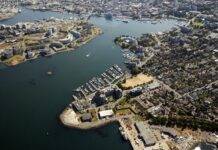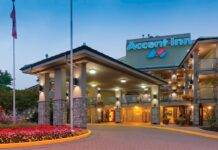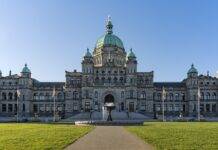VICTORIA – BC Ferries announced today that for the first time in 13 years, the average fares will remain effectively unchanged as the company starts the new fiscal year on April 1, 2016. The company stated that both the price cap increase approved by the Commissioner, as well as an increase in the fuel rebate will be implemented on April 1, 2016, effectively cancelling each other out for a zero per cent net increase to fares.
Fares for vehicles and passengers will rise by 1.9 per cent on average on April 1, 2016. At the same time, an increase in the fuel rebate of 1.9 per cent will be implemented across the system. “With the continued decline in cost of diesel oil coupled with the fact we’ve locked in the price for the majority of our fuel, we are pleased to be in a position to increase the fuel rebate which will negate the tariff increase for all of our customers,” said Dennis Dodo, BC Ferries’ Chief Financial Officer. “Given the current price of fuel on world markets, we expect to maintain a fuel rebate for the foreseeable future.”
In making the announcement, BC Ferries also advised that the cost of reservations, assured loading tickets and the buy-in level for Experience Cards will not increase on April 1, 2016.
BC Ferries will increase the current 1.0 per cent fuel rebate to 2.9 per cent on April 1, 2016 on the major and minor routes. A fuel rebate of 1.9 per cent will be implemented on the northern routes. The fuel surcharge/rebate mechanism is separate from the tariff calculation and any fuel rebate or surcharge is strictly a pass through to the fuel deferral accounts. On September 16, 2015, the BC Ferries Commissioner released the Final Decision on Price Caps for the Fourth Performance Term, in which he confirmed the annual increase in price caps (or average fare increases) at 1.9 per cent from April 1, 2016 through March 31, 2020.
While BC Ferries actively manages expenditures, tariff increases are necessary to cover operating costs and major capital replacement projects. The company needs to replace one ship per year for the next 12 years in order to maintain safe, efficient and reliable service.
Fares for vehicles and passengers will rise by 1.9 per cent on average on April 1, 2016. At the same time, an increase in the fuel rebate of 1.9 per cent will be implemented across the system. “With the continued decline in cost of diesel oil coupled with the fact we’ve locked in the price for the majority of our fuel, we are pleased to be in a position to increase the fuel rebate which will negate the tariff increase for all of our customers,” said Dennis Dodo, BC Ferries’ Chief Financial Officer. “Given the current price of fuel on world markets, we expect to maintain a fuel rebate for the foreseeable future.”
In making the announcement, BC Ferries also advised that the cost of reservations, assured loading tickets and the buy-in level for Experience Cards will not increase on April 1, 2016.
BC Ferries will increase the current 1.0 per cent fuel rebate to 2.9 per cent on April 1, 2016 on the major and minor routes. A fuel rebate of 1.9 per cent will be implemented on the northern routes. The fuel surcharge/rebate mechanism is separate from the tariff calculation and any fuel rebate or surcharge is strictly a pass through to the fuel deferral accounts. On September 16, 2015, the BC Ferries Commissioner released the Final Decision on Price Caps for the Fourth Performance Term, in which he confirmed the annual increase in price caps (or average fare increases) at 1.9 per cent from April 1, 2016 through March 31, 2020.
While BC Ferries actively manages expenditures, tariff increases are necessary to cover operating costs and major capital replacement projects. The company needs to replace one ship per year for the next 12 years in order to maintain safe, efficient and reliable service.
























